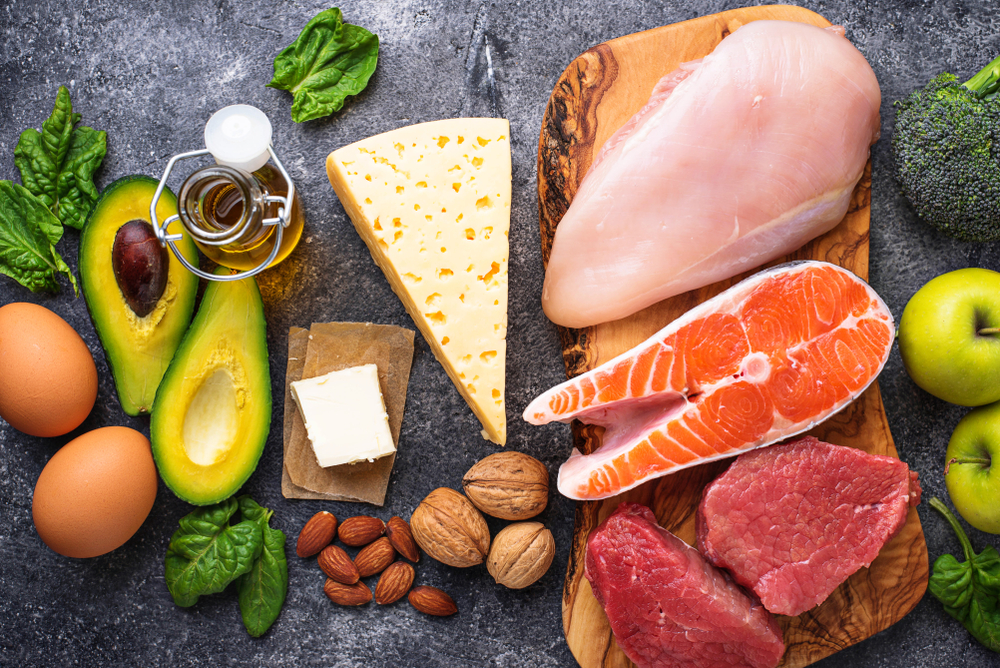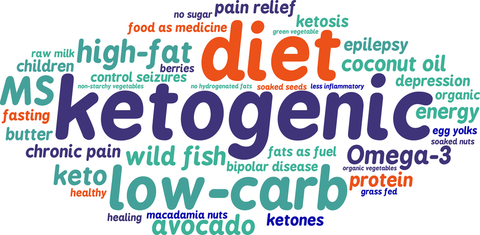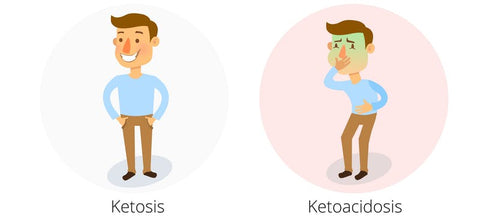Votre panier est vide
Gaining Weight On Ketogenic Diet? Scientists Explain The Truth

More likely than not, you have already heard about the ketogenic diet. This fast-trending diet has quickly gained popularity among those people looking for an efficient approach to losing weight. However, keto is not a newcomer to the playground and, amazingly, it was not designed to lose weight at all. It was first designed to be a simple and non-invasive treatment for medically refractory epilepsy in children, as first described by Dr. Hugh Conklin in the 1920s.[1]
Before we proceed, though, let's cover the basics. A keto diet has the following macronutrient ratio: it's high in fats, sufficient in proteins, and minimum in carbs. Under normal circumstances, the human body depends on carbs as fuel, since they quickly break down into sugars, which excel as an energy source.
But when you go keto, you force your body into a ketosis state - it occurs when your body undergoes a low-to-no-carb diet and ketones start building up your bloodstream. Simply put, a high-carb diet uses glucose as fuel, which means fats remain stored and unburnt, - yes, we're talking about those annoying lifesavers. A high-fat, low-carb diet uses ketones as energy, producing little to no sugars in return.
The ketogenic diet is rapidly becoming a trend, and several celebrities are endorsing it, amongst who we can mention: 2002 Academy Award winner Halle Berry, Hollywood bombshell Megan Fox, Victoria's Secret supermodel Adriana Lima, NBA star LeBron James, and socialite entrepreneur Kourtney Kardashian.
However, when we talk about keto, it's not all bright and safe. Marcelo Campos, a Harvard Vanguard resident MD, also acknowledges the many benefits of a keto diet. He mentions that patients tend to lose weight faster on keto. Additionally, in patients with type-2 diabetes, there is a considerable improvement in blood sugar control. Nonetheless, he warns the general population about the widely unknown long-term effects on the human body.[2]

Celebrities are endorsing it, doctors are concerned about it, studies are inconclusive about its long-term effects, and the general population is widely obsessed about its so-called miraculous results - but what is the truth about the ketogenic diet results? Why are you gaining weight on keto?
We have prepared this detailed and in-depth revision, with all five facts scientifically explained in an easy-to-understand manner. In the end, you'll understand why there are more people gaining weight on keto rather than losing it.
1. A Ketogenic Diet Forces Your Body Into A Ketosis (NOT Ketoacidosis) State
As we have previously seen, ketosis is a state in which your body produces ketones as a primary source of energy, due to carb deprivation. Don't confuse this with ketoacidosis, which can happen under two circumstances. First, you're a patient undergoing type-1 diabetes with an entirely dysfunctional pancreas, which means your insulin production is dangerously low.
Alternatively, your ketone production is skyrocketing which, although possible, is unlikely for a non-diabetic individual.[3] Ketoacidosis makes your blood acidic up to potentially life-threatening levels, while ketosis drives your body into a more efficient fat-burning state, which leads us to our next fact.

2. Actual Ketosis Is VERY Difficult To Reach
You already know what ketosis is but, do you know how to measure it? Just like most metabolic processes, ketosis relies considerably upon macronutrients - a reminder, we're talking about fats, proteins, and carbs. While it's true that there's not one ratio written upon stone, most scholars agree you can enter ketosis following these two proportions: 3:1 and 4:1.
In simple words, both take into account your total calorie consumption. The first one requires a 75% of fats with a 25% of combined proteins+carbs. The second ratio calls for an 80% of fats and a 20% of mixed proteins+carbs. Both recommend no more than 5% of carbs.[4]
A proper macronutrient ratio is paramount for a successful keto diet, which is why most people fail at it, experiencing nothing more in ketosis but gaining weight.
3. Ketosis Can Be Harsh On Your Body, At First
Imagine that every day, for years, you have been driving your comfortable car to the office. Now imagine, we take your car away, and force you to take public transportation instead. You're not going to like it - in fact, you're probably going to hate it.
But if you understand there is no other way, you will get used to it. We despise unexpected changes, but we also adapt to them very quickly, and the same happens at a molecular level. After a lifetime of breaking down carbs for energy, your body has an army of enzymes built up for this purpose - not the case with fat-dealing enzymes.[5]

When entering ketosis, your body will not instantly get the memo, and the depletion of glucose will lead to lethargy, headaches, dizziness, and mood variations due to a shortage of electrolytes - which takes us to our next point.
4. Any Electrolyte Imbalance Will Raise Your Thirst And Sodium Appetite
The following 2015 study reveals that when your body suffers from an electrolyte imbalance, it also enters a state of sodium starvation.[6] This ionic disruption happening within your body makes you extremely thirsty while also affecting your sodium appetite - your body will send you non-stop signals, craving for salty things. While sodium is a fundamental component of our metabolic processes, its presence in excessive amounts could lead to a myriad of unhealthy situations.
Lastly, don't think of water as this harmless life source. Excessive water consumption could lead to a very severe (and sometimes deadly) condition called hyponatremia - when your body hits dangerously low blood sodium levels. As you can see, sodium is a key player, and it needs to remain balanced. Too much of it and you'll surely gain weight; too little, and you might even die in the process.
5. Ketosis Is Not Only Physiological, But It's Also Neurological
According to this 2015 study, there is more to ketosis than a mere metabolic shift within your body.[7] There is a small region of the brain called the hypothalamus. It controls, among a set of other functions, the correlation between hunger and satiety - it determines whether or not you will feel the need to eat. This ketosis research connects three key players responsible for this correlation: the hypothalamus, the blood-brain-barrier, and the gut microbiota. When all of them are working correctly, you will feel hunger and satiety exactly when you have to.
But what happens if one of them is malfunctioning? Keto might produce exceptional results to some, but as far as we know, it's one of the most challenging diets to follow - since even the tiniest slip can make you gain weight.

For instance, eating too many proteins while on keto can make your gut microbiota foster a culture of bad bacteria.
Your gut gets messed up and keeps sending "hunger" signals to your brain. That is when you will struggle to lose weight.
To curb their cravings and heal their gut health... Many users have consumed a natural probiotic formulation called Provitalize.
References:
1. https://www.ncbi.nlm.nih.gov/pmc/articles/PMC2902940/
2. https://www.health.harvard.edu/blog/ketogenic-diet-is-the-ultimate-low-carb-diet-good-for-you-2017072712089
3. https://www.ncbi.nlm.nih.gov/pubmed/23547550
4. https://www.ncbi.nlm.nih.gov/pmc/articles/PMC2656445/
5. https://www.ncbi.nlm.nih.gov/pmc/articles/PMC3945587/
6. https://www.ncbi.nlm.nih.gov/pubmed/25572931
7. https://www.ncbi.nlm.nih.gov/pmc/articles/PMC4313585/
